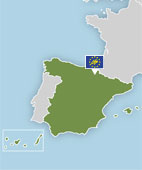Recyship

 |
Recyship - Pilot project for the dismantling and decontamination of discarded boatsLIFE07 ENV/E/000787 |
 |
CONTACT DETAILS
Contact person: Miguel Ángel García Molina
Tel: +34 948 15 35 29
Fax: +34 948 15 23 35
Email: This email address is being protected from spambots. You need JavaScript enabled to view it.
Link: LIFE07 ENV/E/000787
Ship Recycling link
PROJECT DESCRIPTION:
Background
A ship reaches the end of it working life after 20-30 years and is sold as scrap and dismantled to recover the steel. Almost 90% can be reused as high-quality steel. The problem is that the remaining 10% contains high quantities of dangerous waste. In the 1970s, ships were dismantled in European ports. It was a complex and mechanised industrial operation. Greater environmental regulation, and higher security and health standards, however, increased the costs and the industry moved its operations to cheaper countries, in particular those in Southeast Asia (Bangladesh, India and China), as well as Turkey. In contravention of the Basel Convention, which bans the export of dangerous waste to developing countries, ships are now being dismantled overseas. In these countries, workers often lack protection, and health and safety standards are poor. A great quantity of waste is dumped directly into the environment.
Objectives
The objectives of the RECYSHIP project were to:
- Develop a technically and economically feasible, safe and environmentally sound methodology for the dismantling and decontamination of end-of-life vessels;
- Reanalyse European and national legislation in order to ensure the acceptance of the principles of the Basel Convention, as well as general and specific environmental principles for end-of-life vessels;
- Assess the methodologies for decontaminating and dismantling end-of-life ships that will take into account the technical, environmental and labour standards (and based on this analysis develop prototypes);
- Develop a pilot test in a properly equipped shipyard in the southwest of Europe, where the prototype will be validated; and
- Conduct a coastline capacity and impact study for Spain and Portugal, and draw up homogenous land units for these two countries.
Results
The Recyship project fulfilled all its objectives, making a thorough analysis of existing normal practices and taking active part in the drawing up of the EU regulation on ship recycling. The project team made some recommendations during the public information process and developed an interesting analysis of the state-of-the-art techniques used in ship dismantling. The Portuguese partner, Navalria (a dangerous waste management company, in charge of the dismantling tests) was the first company to obtain a permit for ship dismantling in Portugal and Spain. Thanks to the experience gained with the dismantling tests, the project was also able to develop an Integrated Management System operating on very detailed procedures that covers the whole dismantling process – from the purchase, transport and waste management.
The system developed by the project minimises potential environmental impacts and health and safety risks, and also optimises steel recycling. The environmental benefits are:
- Reduction of risks associated with the transport of ships that are difficult to navigate and are often dismantled in countries where environmental and safety standards are not respected;
- Avoidance of risks associated with an inappropriate management of dangerous waste;
- Improved the use of scrap steel; and
- Reduction of accidents during the dismantling operation with the use of specific dismantling procedures and risk identification.
A total of three prototypes were developed and tested: an automated steel cutting machine, a TBT scraping machine and a bilge water treatment plant. Three ships were dismantled in total, while retired submarine from the Spanish Navy was purchased and decontaminated. Moreover, a spin-off company was set up to carry out ship recycling activities. It was funded by the beneficiary just after the end of the project. Reciclauto Reciclaje naval, S.L. will contribute to the development of a new economic activity at regional and national level. The beneficiary has estimated that in the long term, up to 400 jobs could be created in Spain, on the bases of 120 ships recycled every year.
The project was also very timely, finishing just a month ahead of the approval of an EU regulation on ship recycling. When the project started, the regulation was in its first phase of development, and the beneficiary had the opportunity to make a valuable contribution during the public information process. Many of the main recommendations of the project were included in the regulation, including:
- Inclusion of an specific LER code for end-of-life ships;
- Banning of ships dismantling using beaching and landing techniques;
- Creation of a register of facilities authorised for carrying out ship recycling activities; and
- Creation of and European Integrated Management System to assure the sustainability of the sector.
ENVIRONMENTAL ISSUES ADDRESSED:
Themes
Environmental management - Integrated management
Environmental management - Life Cycle Assessment-Management
Risk management - Natural risks (Flood - Forest fire - Landslide)
Risk management - Pollutants reduction
Waste - Hazardous waste
Waste - Waste recycling
Keywords
hazardous waste‚ shipbuilding‚ waste treatment‚ maritime transport
Natura 2000 sites
Not applicable
BENEFICIARIES:
Coordinator Reciclauto Navarra S.L.
Type of organisation SME Small and medium sized enterprise
Description The coordinating beneficiary is RECICLAUTO NAVARRA SL. It is a private company involved in engineering and design of decontamination and waste recycling systems; implementation of environment and quality management systems (ISO14001); projects to secure environmental licences and waste management permits; waste management and treatment; and environmental impact studies.
Partners PRYSMA, Spain FATRONIK, Spain Navalria Dry Docks, Spain FWD, Spain
ADMINISTRATIVE DATA:
Project reference LIFE07 ENV/E/000787
Duration 01-JAN-2009 to 30-SEP -2013
Total budget 3,393,046.00 €
EU contribution 1,686,773.00 €
Project location Navarra,Centro





